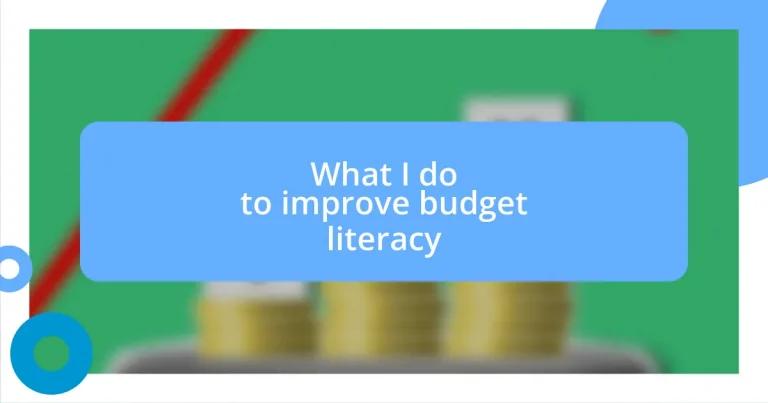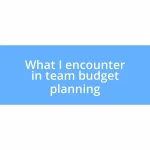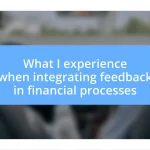Key takeaways:
- Budgeting serves as a financial roadmap, helping prioritize expenses and reduce stress from unexpected costs.
- Assessing your financial situation with a checklist can reveal spending patterns and promote better financial habits.
- Setting clear, tangible budgeting goals boosts motivation and allows for more informed financial decisions.
- Consistent expense tracking enhances awareness of spending habits and encourages smarter financial choices.
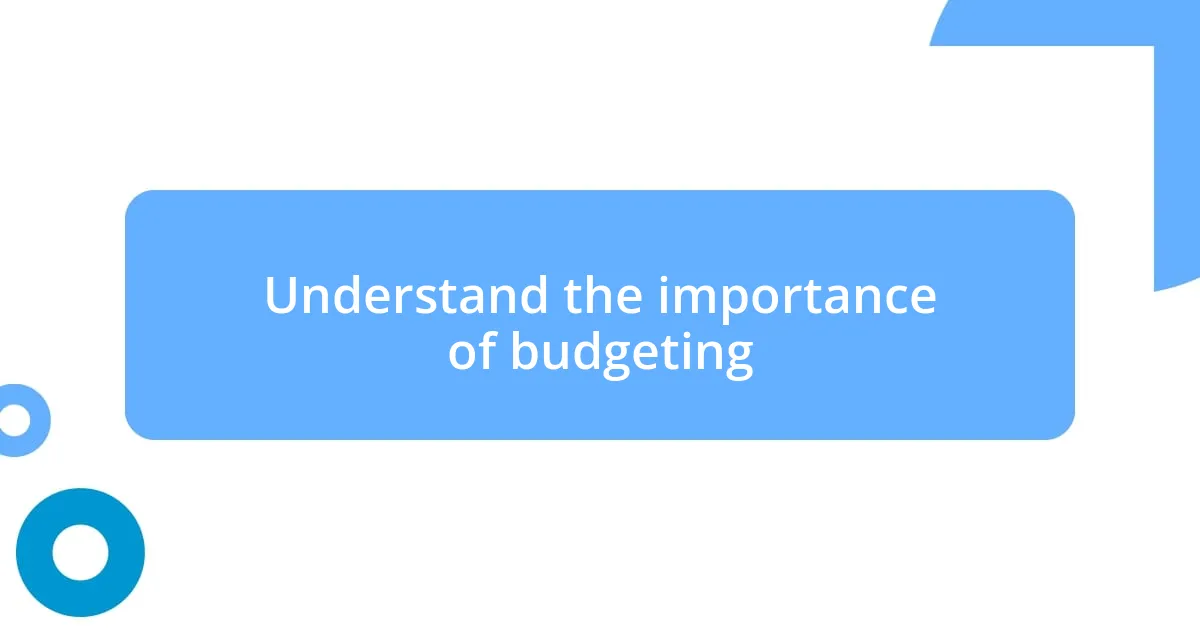
Understand the importance of budgeting
Budgeting is like having a roadmap for your finances. When I first started managing my money, I realized that without a plan, I was wandering aimlessly, often stressed about unexpected expenses. Have you ever found yourself in that situation, juggling bills and wondering where your money went?
The importance of budgeting goes beyond just numbers; it shapes your financial future. For me, establishing a budget helped clarify my priorities—like saving for that dream vacation without sacrificing my daily coffee fix. It’s a balancing act that, when done right, empowers you to make informed choices and enjoy life more fully.
Think about it: if you’ve ever felt overwhelmed by debt or caught off guard by an emergency expense, you know why tracking your money matters. I remember my own wake-up call—a surprise car repair that strained my wallet. It was a tough lesson, but it drove home how budgeting isn’t just about restriction; it’s a tool for freedom and confidence.
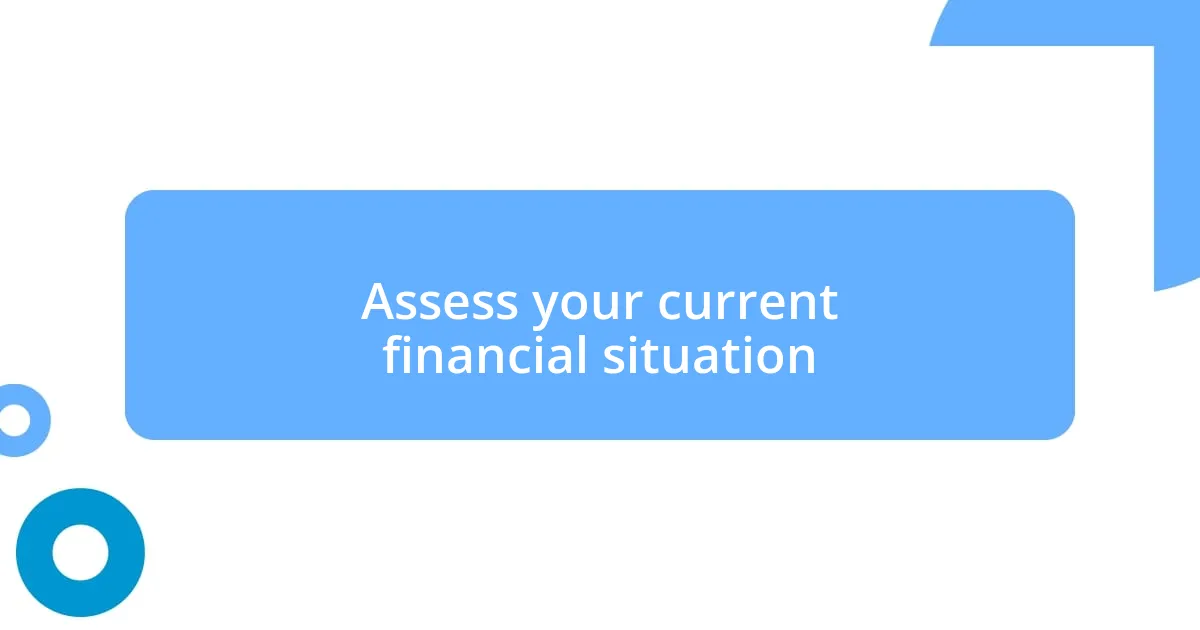
Assess your current financial situation
To effectively assess your current financial situation, start by gathering all relevant financial documents. I remember sitting at my kitchen table, surrounded by receipts, bank statements, and bills, trying to piece my financial picture together. It felt overwhelming at first, but seeing everything laid out helped me gain clarity. It’s essential to understand where you stand before moving forward.
Here’s a simple checklist to help you evaluate your situation:
- List all sources of income (salary, side gigs, passive income).
- Note fixed expenses (rent, utilities, subscriptions).
- Track variable expenses (groceries, entertainment, dining out).
- Assess debts (credit cards, loans) along with their interest rates.
- Calculate your savings (emergency fund, retirement accounts).
- Reflect on any recent financial changes (job loss, new expenses).
By doing this, you’ll find patterns in your spending habits, which can be a real eye-opener. Like when I discovered I was spending way too much on takeout, it motivated me to cook more at home, saving money and learning new recipes in the process! Assessing your finances isn’t just about the numbers; it’s an opportunity for introspection and growth.
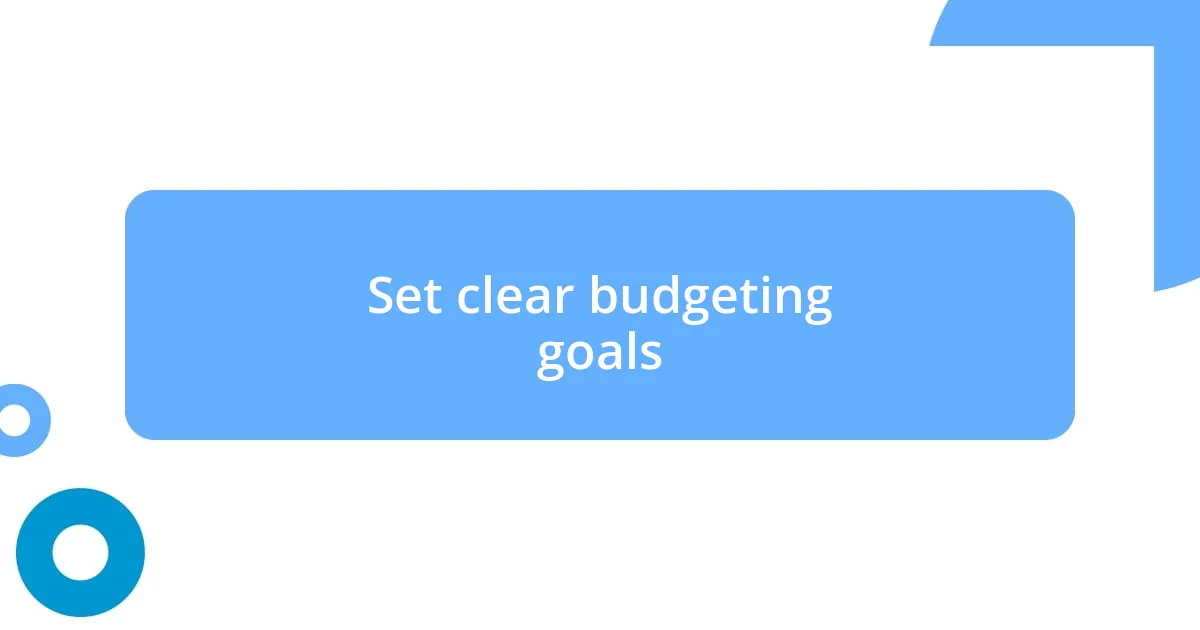
Set clear budgeting goals
Setting clear budgeting goals is crucial for effective money management. When I began budgeting, I realized that having specific targets transformed my approach. Instead of just saying, “I want to save money,” I started setting tangible goals, like “I want to save $5,000 for a trip next summer.” This clarity made it easier to make everyday financial decisions.
I found that breaking my goals down into smaller milestones significantly helped me stay motivated. For example, I aimed to save $500 every month, and by keeping track of my progress, I noticed how each little victory boosted my confidence. It’s funny how seeing those numbers rise can give you a sense of achievement that empowers you to keep pushing forward.
To make the most of your budgeting goals, write them down and revisit them regularly. From my experience, this practice creates accountability and allows you to adjust as life changes. I recall a time when unexpected expenses cropped up, and I had to recalibrate my goals. It was a chance to reflect on what mattered most and reaffirm my commitment. By setting and reviewing clear goals, I turned budgeting from a chore into a rewarding journey.
| Type of Goal | Description |
|---|---|
| Short-term goals | These are achievable within a year, like saving for a new gadget or paying off a small debt. |
| Medium-term goals | These focus on plans over one to five years, like saving for a home down payment or a wedding. |
| Long-term goals | These involve saving for retirement or funding a child’s education, typically taking over five years. |
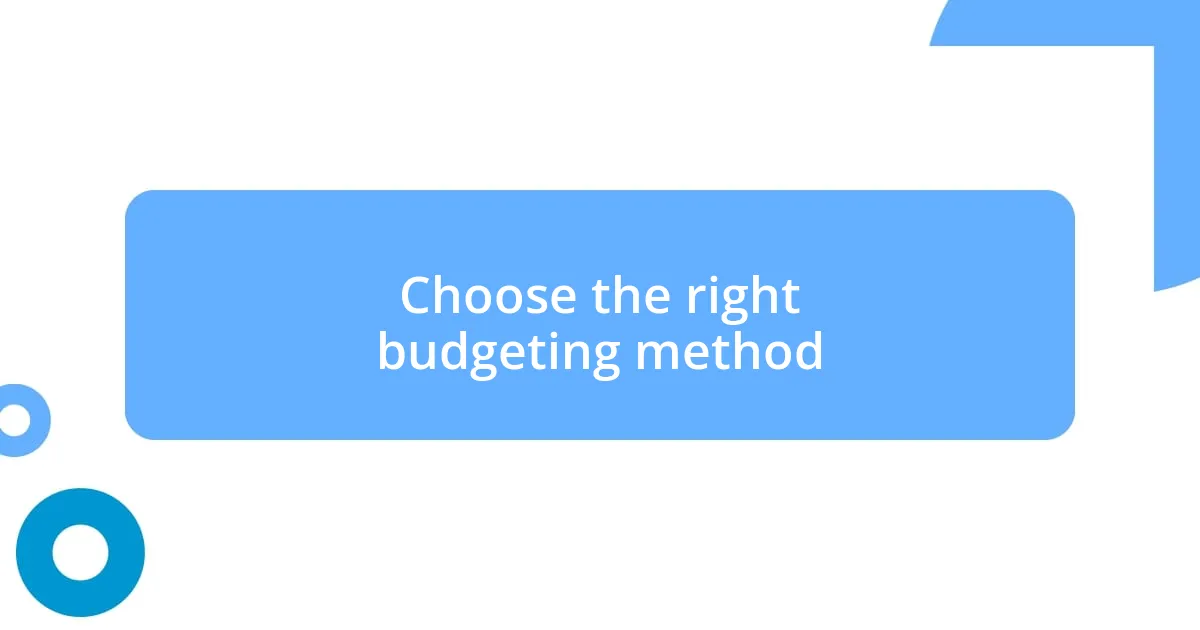
Choose the right budgeting method
Choosing the right budgeting method can truly transform how you manage your finances. When I started my budgeting journey, I stumbled upon several methods like the envelope system and zero-based budgeting. Initially, I felt overwhelmed by the variety; how could I possibly know which one suited me best? Ultimately, I found that experimenting with different methods helped me discover what felt most natural for my spending habits and lifestyle.
For instance, after trying the 50/30/20 rule, where I allocated 50% of my income to needs, 30% to wants, and 20% to savings, I realized it brought a sense of balance to my budgeting. I still vividly remember my excitement when I found a method that allowed me to enjoy eating out while still prioritizing savings. It made budgeting less of a restriction and more of a plan that allowed me to enjoy life without guilt.
Have you ever considered how your unique financial situation impacts which budgeting method you choose? I learned that personalizing my approach was critical. For example, if your expenses fluctuate each month, a flexible method like the percentage-based system might suit you better than a rigid one. Adapting my budget method to fit my reality was a game-changer—it made financial planning not just achievable, but enjoyable.
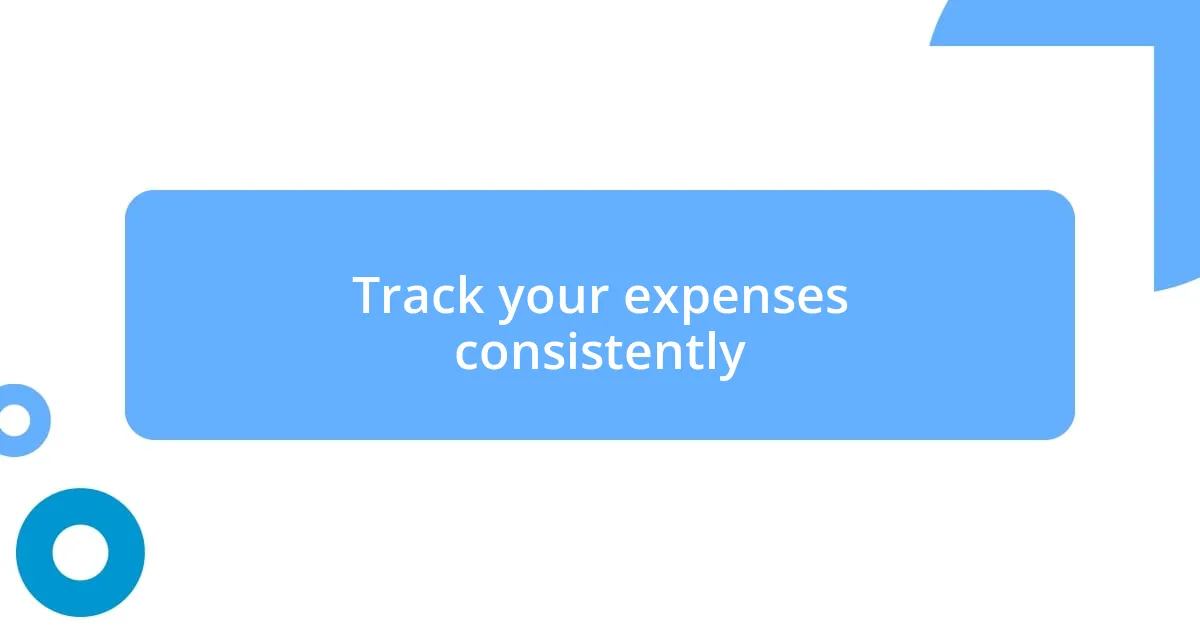
Track your expenses consistently
Tracking your expenses consistently has been one of the most transformative practices in my financial journey. When I first started, I assumed I could manage it mentally, but I quickly realized that without concrete data, I was just guessing. I remember one month vividly when I discovered that my spontaneous coffee runs were costing me nearly $150! That realization was a wake-up call and made me appreciate the power of tracking.
I decided to use a simple app on my phone to log every expense, no matter how small. It became a habit, almost like journaling. In the beginning, I felt overwhelmed, but over time, it morphed into a daily reflection that not only illuminated my spending but also educated me on my habits. You know what’s amazing? The more I tracked, the more conscious I became about where my money went, leading to smarter choices and a sense of control.
Have you ever considered how tracking expenses could reveal patterns in your spending? For me, it showed where I could snip unnecessary costs without feeling deprived. I recall a time when I challenged myself to cut back on dining out. By tracking those expenses, I noticed how often I opted for convenience over health or cost. That insight didn’t just save me money; it encouraged me to cook more often and embrace healthier meals, turning a necessary habit into an enjoyable experience. By staying consistent with my expense tracking, I’ve not only improved my budget literacy but also reshaped my financial future for the better.
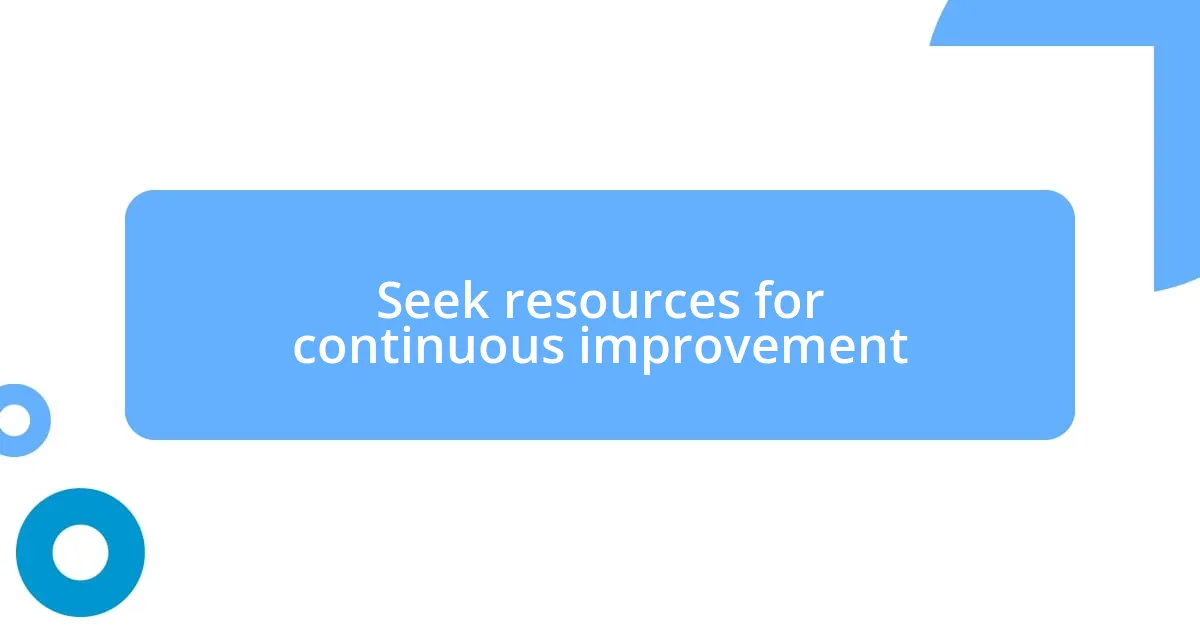
Seek resources for continuous improvement
One of the best ways I’ve found to improve my budget literacy is by seeking out various resources that promote continuous learning. Books, podcasts, and online courses have all played significant roles in expanding my understanding of personal finance. I remember the thrill of stumbling upon a podcast series dedicated entirely to money management tips. It felt like having a personal finance coach in my ear during my morning runs, reinforcing key concepts while I got a dose of motivation.
Another valuable resource for me has been engaging with communities—both online and offline—where sharing ideas and strategies is encouraged. I joined a local budgeting group, and honestly, the collective wisdom was eye-opening. It was fascinating to hear how others approach their finances. Did you know that learning from others’ experiences can make a significant impact? I learned about investment courses that focused on practical aspects and even found a few free workshops offered by local nonprofits. Those opportunities not only enriched my knowledge but also gave me actionable steps to implement.
Moreover, I regularly browse blogs and articles that touch on the latest trends in personal finance. They keep me updated and often inspire me to rethink my current strategies. Just last week, I read about the benefits of automating savings, which made me immediately reevaluate my savings setup. Have you ever thought about how technology can simplify your budgeting? I certainly have! By actively seeking and utilizing these resources, I’ve found that continuous improvement isn’t just beneficial; it’s essential for staying ahead in my financial journey.












